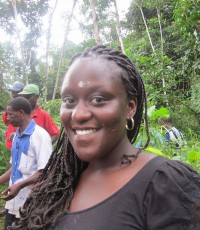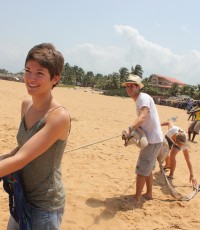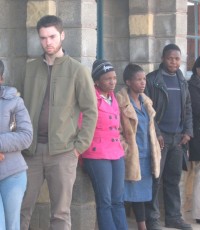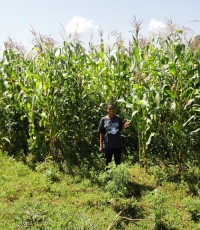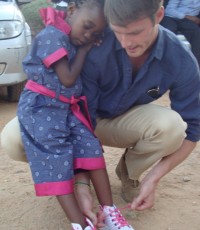November/December 2012
It’s a busy, but interesting time at Princeton in Africa. This November, we received a record 466 applications from young adults from 131 different colleges and universities for our 2013-14 fellowship year.
Reading through this year’s applications, I was inspired to see so many well-qualified, sincere, intelligent young adults eager to spend a year of service in Africa. Nearly all of our current partner organizations have enthusiastically signed on to have another PiAf Fellow next year as well.
While we are busy reviewing applications for next year, this year’s Fellows are hard at work across the continent. From discovering how sea cucumbers can improve incomes as well as marine resources to assisting with an international organization’s emergency response to flooding, the Fellows Flyer provides a great snapshot of our program.
Enjoy this edition of the Fellows Flyer. And from everyone here at Princeton in Africa, we wish you a joyful holiday season and a happy new year!
Katie Henneman
Executive Director
P.S. Thank you very much if you have donated to Princeton in Africa this year! We are incredibly grateful for your support. It’s not too late to include PiAf in your end-of-year giving – click here to make a tax-deductible donation online or here to learn more about supporting PiAf.
PiAf Connections
Please click below to check out pictures of our Fellows, Alums and other members of the PiAf family meeting up at home and around Africa.
Notes from the Field
By Akornefa Akyea, 2012-2013 Fellow with Olam International in Gabon
I seem to be sitting at the cusp of development and decision making at my now four-month sojourn with Olam in Gabon. There are so many new projects Olam is partaking in, such as large-scale palm plantations still in their nursery stage and a new special economic zone. What is most exciting about this time is the wonderful platform I have as a Fellow with Olam and my role as a part of the corporate social responsibility (CSR) team. It has been interesting to see how a large for-profit company reconciles their need to profit as a business and the responsibility they have to the communities and environment they will be impacting with their projects.
As a part of the CSR team, I have been working with the communities in Mouila, a city about 6 hours southeast of Libreville, which are impacted by Olam’s palm plantation. I work closely with the social communicators there who focus on familiarizing themselves with the villages, their way of life, what aspects of their life are affected by Olam’s presence and how we can reduce our impact, ultimately, to aid in community development. Once Olam’s social projects have been agreed upon with each village, we work on implementing them in the most sustainable way possible. As a recruit fresh out of college, I was expecting to simply observe this side of business and development take place and pitch in when directed. Instead, I found that I am encouraged to design and execute my own projects, propose new strategies, and participate in important discussions that directly impact the lives of over 1,000 community members.
Working in Mouila has given me the opportunity to experience a new side of Gabon that is neither the city life of Libreville nor the safety net of Owendo where I live with the other Fellows. Visiting the quiet surrounding villages, attending a traditional bwiti ceremony, hiking through dense forests, and getting to taste delicious Gabonese cuisine have all impacted my experience and understanding of Gabonese culture significantly. Mouila provides me with the perfect balance of beautiful beaches, an incredible community of friends I have built with the four other Fellows and Indian architects who live next door to us in Owendo, with the independence and rich culture provided in village living.
It is scary and thrilling to think that the direction of the social projects may depend on some of my ideas, input and research. However, it is also incredibly humbling and uplifting to be given this much responsibility and trust on these projects. Even with the enormity, I am often reminded, in those moments of spending time by the ocean or being enveloped by the dense forest on the drive to Mouila, of my favorite French phrase, ‘ça va aller.’ Literally, it’s going to go and more colloquially, it’s going to be alright.
Notes from the Field
By Jen Byrne, 2012-2013 Fellow with World Food Programme in Benin
It amazes me how quickly my life here started to feel so normal, and how quickly I’ve gotten used to many things that just don’t happen back home – like taking motorcycle taxis everywhere I go, or bargaining for every single purchase I make, or speaking so much French that I am sometimes even starting to think in French. These things have now just become a part of my daily routine.
For the past five months, I’ve been living in Cotonou, a vibrant and sprawling city within the small West African country of Benin. Thanks to PiAf, I’ve been given the incredible opportunity to learn firsthand how a United Nations agency functions through my placement with the largest humanitarian organization addressing hunger in the world. The World Food Programme, or the Programme Alimentaire Mondial in French, is the United Nations food assistance agency, whose work consists of both humanitarian and emergency projects as well as longer term development projects for populations in need. I work within the Programming unit of our office that deals with the planning, monitoring and evaluation of WFP Benin operations. My official title is the Pipeline and Reports Officer, which means that I write periodic reports on the status of our programs that are then sent to the Regional Bureau in Dakar and to Headquarters in Rome. Most recently, I was given the responsibility of drafting an Immediate Response Emergency Operation for the recent flooding that occurred in northern Benin. This document summarized the crisis, highlighted the needs of the population and outlined WFP’s initial planned response. As the project gets started, I hope to be able to travel north and see what a WFP emergency operation looks like on the ground. Just this past week, I got to accompany one of our Food Aid Monitors and followed a WFP truck as it delivered the first food distributions of the school year for our school feeding program.
Outside of work, I take guitar lessons, go for runs, make lots of tropical fruit smoothies, and try my best to learn Fon. My weekends are filled with lots of beach and pool time, reggae bars, live music, and weekend getaways to some of Benin’s quiet coastal towns. Living here in Benin has given me a chance to meet people from all over the world, and the friendships I’ve developed thus far at work with my WFP coworkers and outside of the office with expats and locals alike have truly made these last five months such a fun and fulfilling experience and have taught me an immense amount about myself. I cannot wait to continue exploring both my work at WFP and Benin, and to see what else this year has in store for me!
Notes from the Field
By Neal Emery, 2012-2013 Fellow with Baylor International Pediatric AIDS Initiative in Lesotho
“Dr. Neal, where do you want to work?” asked a nurse, about my age, while setting up for an event in the Thaba Tseka district of Lesotho. As I explained that I am neither a doctor nor a nurse, she inquired “Oh, then why are you here?”
Without much in the way of formal medical or public health education, I reflected on this question often after I arrived in Lesotho. As Community Outreach Coordinator for the Baylor International Pediatric AIDS Initiative in Lesotho, my job changes by the day: I oscillate between computer-bound data analysis or writing and working with our patient population through outreach events. This particular afternoon, my coworkers and I found ourselves at a primary school perched above a reservoir. Even though only a few houses dotted the barren surrounding mountains, hundreds of parents lugged children to the event. In the previous two weeks, we had worked with the local government to organize this HIV testing and basic public health event for the residents of this isolated enclave, hours walk from the nearest health center. Lesotho is a country of slow-moving crises – suffering from problems that fester and draw little international attention. Antiretroviral drugs ensure that HIV does not have to be a death sentence, but still nearly one in four individuals is infected. Few die of starvation, but food insecurity and stunted growth are nearly ubiquitous in rural areas.
Despite these long-standing problems, I have witnessed Lesotho’s development in my short time here. An immaculate referral hospital opened next to Baylor not long before my arrival and, in the past three months, construction finished on the city’s second shopping mall and ground will soon break for a third. I live in a beautiful row house triangulated by the malls that, besides for bars on the windows, could fit in any middle class neighborhood in the US, Europe, or South Africa.
Yet, every morning, as my roommate and I drive to work and cross a hill crowned by a brand new parliament, the landscape begins to shift. Trees become less frequent, buildings show signs of wear, and poverty becomes less hidden. Though only a few kilometers from the glitz of the new mall’s international chains, the small cinderblock houses surrounding Baylor’s clinic look untouched by the investment down the road. When I first arrived here, I thought that the place where I live and the place where I work existed in different worlds. Yet, during my time here I’ve seen the overlaps and interference between the two that shape everyone’s life. During the HIV testing event on the side of the mountain on Thaba Tseka, a boy pulled out a cell phone and snapped my picture. Even in towns that feel cut off from the rest of the world, shacks selling Coca-Cola and mobile phone airtime remind me that we are all passing between these two spheres.
This is just one revelation I have come to about life in Lesotho. With the rest of my fellowship, I look forward to continuing to interact with and better understand the lives that people create lodged in the folds between mountains and the dusty roads of Maseru.
Notes from the Field
By Ida Girma, 2012-2013 Fellow with World Food Programme in Ethiopia
On my 57th day in Ethiopia, it simultaneously feels like I’ve only been here for a week and like home. I arrived Saturday, September 1 (the day before the late Prime Minister Meles Zenawi’s funeral), and went to work that Monday morning. I work at the UN World Food Programme (WFP), where I collect, write, and disseminate information about our work to governments, relevant organizations, journalists, potential donors, and the public at large. I travel to cover progress in our beneficiary communities, represent WFP at the UN Communications Group, and will write our 2012 Annual Report.
What I love most about my job is speaking with people about their experiences, struggles, and hopes, and that in order to perform well, I must have an in-depth knowledge of the Ethiopian situation and all the programs WFP conducts. This means I must know as much about nutrition for lactating mothers as I do about agro-pastoral land use in the Somali region.
But, I have to admit that my favorite thing about Ethiopia is not just work. Here’s why I love it here:
- I am learning Amharic. I’m first generation Ethiopian-American, and growing up, my parents spoke to me in Amharic, and I answered in English. So, I’m a little rusty. Here, I take language lessons twice a week with a wonderful woman named Yissema, and am getting closer to being able to talk freely with the older and extended members of my family and fulfilling a long-time personal goal. Wish me luck! As the Ethiopian saying goes, “Kes be kes, inkulal be igir tihedalech” (Slowly but surely, an egg will walk on two feet)!
- The people! I’ve met kind, optimistic people from all walks of life over the past two months—for this, I’m grateful. Also, I enjoy regularly spending time with my (many) cousins, and the other PiAf fellows in Addis! Seriously, PiAf could not have picked a better group. Nastasia Paul-Gera, Mark Birhanu and Kelsey Lilley are my crazy extended family here.
- The food. I love Injera. Every day is an indulgence. Special shout out to doro wot. On a healthier note, breakfast here is also amazing—some of my staples: scrambled eggs, heart-shaped waffles, papaya, avocado, oranges, ginger tea.
- The music. Teddy Afro, Jah Lude and other contemporary artists, but even more so, the classics—Tilahun Gessesse, Mahmoud Ahmed, Mulatu Astake (I suggest the Ethiopiques disc set if this all sounds like… Amharic to you).
- It’s beautiful. Driving through shockingly green parts of the countryside makes it hit home that Ethiopia’s problem feeding itself has many factors, none of which are a basic lack of food. Limited market access and integration, limited infrastructure, poverty, untapped production potential, land degradation in some areas and political factors all contribute to the country’s failure to get its food into the hands of its people.
And because no list would be complete without at least a couple of cons:
- Gender Issues. Women often don’t get the respect they deserve, and this manifests in ways both seemingly minor and extremely grave. The alarms don’t sound quite as loud as they do in the States. Feminists have a lot of work to do here and globally. PiAfers, let’s all keep an open dialogue about this!
- BUG BITES.
Well, that’s all for now! Amiseginalehu (thank you) for reading!
Notes from the Field
By Taylor Mayol, 2012-2013 Fellow with Blue Ventures in Madagascar
Have you ever encountered a live sea cucumber?
I hadn’t either until just a few months ago. I knew I was in for a wild ride during my fellowship after I dove into a crystal clear turquoise bay in southwest Madagascar to check out Blue Ventures’ (BV) community-led aquaculture project, and resurfaced with a grey, cucumber-like sea creature in hand. Sea cucumbers are delicate bottom-feeders that feel a bit like wet paper mache and are an expensive delicacy in many Asian countries. BV works with fishermen who are traditionally dependent on the sea for their cultural identity and subsistence, to run sea cucumber farms, which provide a lucrative source of income and offer an alternative to relying on dwindling marine resources. The strangeness of the concept of farming sea cucumbers is pretty much a microcosm of my experience so far in this fairly schizophrenic and unique country, which is quite far from “Africa” in both the literal and figurative sense.
As the communications and program development officer for Blue Ventures, a marine conservation NGO with a holistic “Population, Health, and Environment” approach, I must intimately know our entire project portfolio: from these aquaculture farms to UNICEF-funded youth education programs to reproductive health care to coral reef research, to mention just a few. At BV we believe that conservation can’t take place in a bubble and that the health of an environment is intrinsically linked to the well-being of its community, particularly here in southwest Madagascar, home to some of the country’s most isolated people.
With admittedly zero background in conservation, I was expecting to be surprised and challenged by my post, but I had no idea how much I would actually need to absorb right off the bat. It was pretty much a sink or swim kind of situation: to truly succeed at my job I head to jump headfirst into BV and learn all the ins and outs of its work over the last decade. Now, I can spout facts I never imagined I would know, like life cycles of octopus, the importance of tidal fluctuations, the carbon sequestering capacity of mangroves.
A perk of my job has definitely been the travel, undoubtedly extra special here in the world’s so-called “Eighth Continent.” I have traversed many of Madagascar’s ecosystems, from the chilly plateau in Antananarivo, southward through rolling red hills and endless green rice paddies to dry savannah and my coastal home in Toliara. I have ventured up the sandy and bumpy coastline through the incredible dry Spiny Forest and recently spent half of October trekking around and camping near Belo sur Mer, where we work with communities to conserve mangroves and increase fish and crab catches, about 30 hours from Toliara by taxi brousse (packed in sardine-style, of course).
My most notable memories include hiking in the massive, rocky Isalo National Park and jumping into magically appearing natural green pools of water to cool off; seeing mouse lemurs at night; traveling by dug-out canoe in the open ocean and getting soaked to the bone; and fighting off Madagascar hissing cockroaches. Professionally, I’ve been given incredible responsibility and independence and I’ve learned how to write grants and scientific research reports, am working towards publishing my first journal article, and even met with National Geographic. Along the way, I’ve picked up a (small) bit of Malagasy from my coworkers and am (very) slowly but (somewhat) surely working on my French.
The last four months has given me new friendships, deeper insight into my own life, and a new appreciation for conservation and it’s ties to food security and poverty alleviation. The absolute highlight, however, has been working for a mission-driven organization that operates at the junction of academia and reality, and is actually implementing development theory in a setting with tremendous poverty and political instability. Although I have been out of my university classroom for over two years now, everyday at work feels like I am learning again, translating development lectures into meaningful and tangible outcomes, and perhaps even doing something a bit strange, in the best way.
Read more about Blue Ventures: www.blueventures.org
And be sure to like our Facebook page and follow us (me) on Twitter @BlueVentures!Veloma!
Notes from the Field
By Nastasia Paul-Gera, 2012-2013 Fellow with Save the Children in Ethiopia
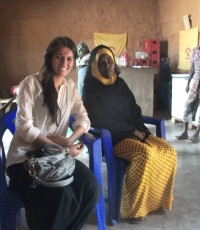
Nastasia has lunch at the home of a member of the Ethiopian Host Community for the Somali Refugee Camps.
Four months into my Princeton in Africa fellowship, I can honestly say that my time in Ethiopia has been as intensive as a year in graduate school plus sunshine, blue skies, and delicious macchiato.
I should have known; when your job description says, “can easily adapt to a constantly changing environment,” assume that they really mean it. One month into my fellowship, my supervisor left. The next few months were spent transitioning Save the Children (SC) from seven independent organizations into one Save the Children International in Ethiopia with 1,800 staff and with a budget of over 100 million dollars annually.
I must admit, the first few days after my supervisor left, I felt a bit like a headless chicken. I quickly realized, however, that if I wanted to make the most of my fellowship, I would have to find my niche and sell myself. So began my work as a Princeton in Africa Fellow on gender. I set up meetings with the Chief of Parties and, if available, Gender Advisors, of SC US. I convinced them that I was a valuable asset. Gender is a hot topic in the development world these days. However, to me, it is painfully obvious that without working on gender, you will only reach half the targeted beneficiaries. Another plus: I was free labor! And so, I wrote the gender mainstreaming guideline for our 40 million dollar Food Security program, I conducted gender trainings for our staff in the Water and Sanitation program, and I collected case studies in the Somali refugee camps in Eastern Ethiopia.
Three months into my fellowship, my new supervisor, the Director of Program Quality for Save the Children International, came in. I had been able to make myself useful previously and now, to someone unfamiliar with Princeton in Africa and the purpose of a Fellow, I had a legitimate platform on which to stand. The case studies I developed are leading to a gender assessment I will carry out in the refugee camps. The gender mainstreaming guideline I developed is being rolled out across the country. And, the Gender Advisor and I will begin developing our organization’s overall Gender Policy and Strategy. Four months ago, I would never have guessed that this is what I would be doing in Ethiopia.
My Princeton in Africa fellowship has been instrumental in guiding me into work that does not feel like work; work that feels so absolutely right for me to be doing because gender inequality is inherently unjust; work that I know I will continue to do for many, many years to come.
Notes from the Field
By Kelly Souls, 2012-2013 Fellow with Indego Africa in Rwanda
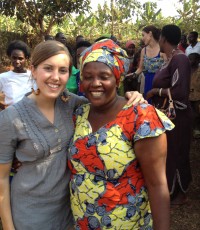
Kelly meets with one of the artisans from the Twiyubake cooperative during an Indego Africa home visit.
My time thus far as a Princeton in Africa Fellow has already provided ample opportunity for personal and professional growth. I have had the exciting opportunity to be the first Fellow to work with Indego Africa as a partner organization. Indego Africa is an innovative social enterprise that works with female artisans in Rwanda who make high-quality handicraft products that are then exported to Western markets and sold at high-end retailers such as J.Crew, Madewell, Anthropologie and more. Indego Africa has two primary goals: to provide Rwandan female entrepreneurs with the opportunity to empower themselves economically by giving them access to export markets and a stable source of income; and to provide education to these women in areas such as Kinyarwanda Literacy, English, Business Management and Computer Skills so that they can become thriving, independent businesswomen. I am constantly enticed to buy the beautiful handicraft products made by these women!
In my short time at Indego Africa, I have already assisted in several large projects, giving me the opportunity to see firsthand the challenges of running a U.S.-based social enterprise in Rwanda. For example, I have helped Indego Africa improve its relations and interactions with Rwandan government officials at both the district and national level. The relationship between NGOs and the state they operate within was something I studied extensively in university; therefore, seeing theory translated into practice has been a fascinating experience. The most exciting experience at Indego Africa has been teaching at one of Indego Africa’s partner cooperatives twice a week. The female artisans at Cocoki cooperative are inspiring in their relentless quest to master English despite the fact that most have had limited formal schooling and have families to care for. Hearing their excited “Good morning teacher” greetings when I arrive at the cooperative to teach always brings a smile to my face. While I may miss my family, I feel like I’ve gained 30 surrogate mothers as these women warmly welcome me into their lives and care for me.
Beyond work, life in Rwanda has been very enjoyable. From weekend trips to Lake Kivu to joining a Saturday running club to see amazing views of Kigali, I have managed to stay busy and socially fulfilled in Rwanda. One of the more humorous elements of my daily life is when I speak Kiswahili to people and see the shocked look on their faces that a mzungu (foreigner) has actually taken the time to learn an African language. I have also relished the opportunity to make Rwandese friends who are incredibly inspiring. All of my Rwandese friends had a tumultuous childhood due to the 1994 genocide in Rwanda, but are remarkably resilient in their ability to move on with their lives and be some the warmest, most hospitable and genuinely kind people I have ever met. Overall, I love my personal and professional life in Rwanda, and thus I am panicking at how fast the time is going by!
Notes from the Field
By Chris Speers, 2012-2013 Fellow with Maru-A-Pula in Botswana
“Flexibility!” This was a term all incoming Fellows heard repeated during our orientation at Princeton in May. Past Fellows, board members, and Princeton in Africa staff extolled on this virtue in meeting after meeting. As a concept, I got it, but was I prepared to put it into practice?
Flexibility is a virtue, like patience, that is best learned through experience. Spending a year in Africa would teach me many things, but the most simple and lasting lesson has been…flexibility! When confronted with the unexpected, you have two choices. One is to recoil, become rigid, and retreat to the safety of what you know. Or, take a deep breath, and launch yourself forward to embrace the unforeseen. I would urge you to do the latter.
Within the first week of arriving at the Maru a Pula School in Gaborone, Botswana, and in the two months since, this mantra would prove to be my new life motto. When I accepted my placement back in April I had been asked to teach history, a subject I was both comfortable with and passionate about. The school had other plans though, and told me when I arrived that they wanted me to teach physical education this term, and coach cricket. As disorienting and unexpected as this proposal was, this whole year was about new experiences, so I embraced these new challenges. Then there was the time that I was invited to a traditional wedding in Francistown. Since it was a holiday, the rest of Botswana had the same idea! As my travel companion and I surveyed the crowded bus terminal, the realization that we were not going to make it out of Gabs anytime soon left us spinning. By 9 pm that same night we were back in Gabs after waiting several hours at the bus station to board a bus, have that same bus break down forty kilometers outside the city, hitch another ride north, but had that cut short when a deer collided with our front windshield. It started as a benign weekend of travel, but turned into a case study in flexibility as each stage of the journey unraveled.
Think of all the folks we would not have met, and the experiences lost if I had not been “flexible” upon my arrival in Botswana. When else in my life will I get to be a gym teacher? While so many of my classmates from college are holed up in small cubicles crunching numbers, I’m outside nearly everyday playing basketball, soccer, volleyball, and more with dozens of kids. There was Aaron: the Motswana man who reached out to help us in the bus station, helping us to get on a bus while also having his own wife and small child to worry about. Yes, the journey to the wedding was difficult, but often those moments produce the best stories. Or the twelve boys on my cricket team who didn’t seem to care that I knew squat about the sport. They appreciated my enthusiasm, and have ended up teaching me more than I could have ever taught them.
Rarely do people choose to put themselves out of their comfort zones or into the unknown. We have a defensive instinct to lock ourselves down and put up barriers when life throws its many curveballs our way and self-doubt creeps in. Those moments can be scary, yes, but I urge you to fight hard against that instinct. Beloved UCLA basketball coach John Wooden once said, “Things turn out the best for those who make the best of the way things turn out.”








